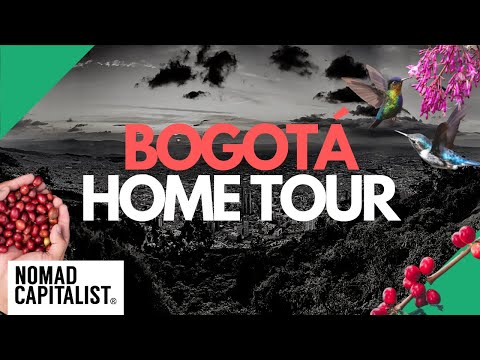The Bogota, Colombia Real Estate Investment Guide
October 21, 2022
There isn’t a better example of a country that has successfully challenged and changed its status quo than Colombia.
What used to be a place overrun with bloodthirsty drug cartels and all-reaching corrupted government officials just a few decades ago is now one of the best countries to invest in Latin America.
And even though some safety issues are still a cause for concern, Colombia is one of the freest economies in the Americas and the fourth largest economy too. Good news, investors.
You might have heard of Medellin as the place to be if you’re traveling to Colombia or are planning to live there. But nothing beats the capital of Bogota when it comes to investing in real estate.
Over 13 million people call this giant metropolis home, and if you always go for real estate markets that get overlooked by others, you must give Bogota a chance. There are plenty of great real estate deals up for grabs – get them while they’re hot.
But the really good news is that while you’re there investing in real estate in Bogota, you might as well get the permanent residence that’s on offer. It could even lead to a second passport if you’re interested.
You see, this Latin American country has some of the laxest immigration laws. Guess where you can just show up with your passport and buy real estate? That’s right, in Colombia.
So, in this guide, we will tell you all that there is to know about investing in Bogota. We’ll cover everything from which neighborhoods you’ll find the best bargains in to how the process of buying real estate in Colombia works in practical terms.
Let’s get started.
Why Invest in Real Estate in Bogota?
If you’re an investor, you need to be looking for high returns and decent liquidity in your investment. And when it comes to real estate investments, there is no better option in Colombia than the capital city of Bogota.
That’s because it’s one of the biggest cities in the Americas: only New York and Mexico City are larger than Bogota.
It’s truly a world-class city.
It’s the most important urban destination in the region for all things relating to the government apparatus, finance, as well as international corporations.
As such, it attracts both locals and foreigners alike. And they will all need a place to live if you care to rent out your Bogota property.
If you’re still worried about the violence and corruption, you’ll be glad to know that the country has cleaned up its act recently.
That said, even though it’s a much safer place now, it still sits pretty high up on the list of the most dangerous countries in the world.
Its position as the 21st on that list does the country absolutely no favors when it comes to tourism; you’ll need to be very picky about the areas that you visit and that you roam at night.
But it’s actually great news when it comes to real estate investment. Plenty of other more ‘conservative’ investors won’t touch Bogota with a ten-foot pole, let alone invest in real estate there.
That leaves plenty of the good deals in Bogota for you to scope out and pounce on. And why should you? Because now is the perfect time.
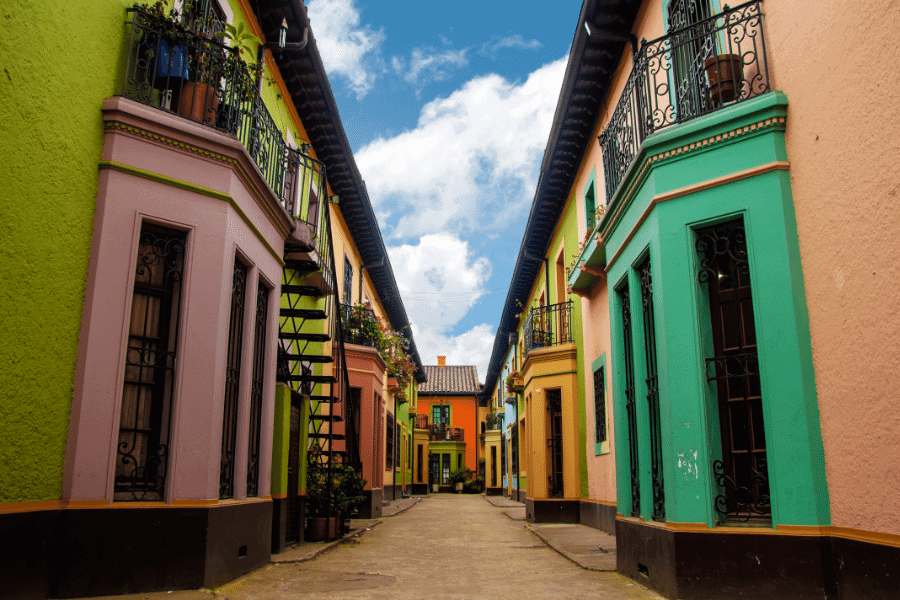
Why Invest in Bogota Real Estate Now?
Simply put, the Colombian peso is at an all-time low; the currency of Colombia is trash.
That makes it great for foreign investors to come in and start buying things up. Even though the peso goes up and down slightly, its long-term perspective is one of feebleness.
However, until the government recognizes just how destabilizing having such a devalued currency is and gives its people what they really want – the US dollar – you’ll have plenty of great buying opportunities.
Currency woes (or joys, depending on who you ask) aside, Colombia is the fourth-largest economy in Latin America. And, taking its size into consideration when compared to the top economies of Brazil and Argentina, it’s no mean feat.
Colombia is also a real success story when it comes to foreign investment. Lots of it has already arrived in the last two decades, but we don’t see it peaking any time soon.
That’s because, economically speaking, Colombia has many things working in its favor. Colombia is:
- Stable. The GDP growth in Colombia has maintained a 4.25% average, which is way above the Latin American average.
- A qualified workforce. The country has the most skilled workers per capita in the entire South American region, surpassing Brazil, Chile, and Argentina. Plus, its population is growing.
- A CIVET country. Colombia is also part of the CIVETS, a term that covers six emerging markets that have the most potential for rapid growth.
- Easy to do business in. Colombia is ranked 42nd in the world – which might not sound that great – but that places it third in Latin America for its ease of doing business.
- Great at protecting its investors. Colombia now has a rating of BAA2 on Moody’s rating system and is one of the top countries in the region when it comes to protecting its foreign investors’ money.
All of these factors combined make Colombia a great country for investing right now.
Living in Colombia
Many places we write about here at Nomad Capitalist are in warm climates and in tax-favorable jurisdictions.
But Bogota is a curveball.
Thanks to its proximity to the equator and its high altitude in the Andes, Bogota’s temperature varies very little. In other words, there are no clearly defined seasons to speak of in Bogota – it’s a city of eternal autumn.
Would you like to experience life with 220 foggy mornings per year, on average? Then this city could be it – much more moody and temperamental than the happy-go-lucky countries and cities that are the world’s top beach holiday destinations.
We like that. Real life and work go on in Bogota, but that’s not to say you can’t have an excellent quality of life.
In fact, the lifestyle is probably one of the most attractive parts of investing in real estate in Colombia or even choosing to move there.
We’re not saying you have to live in Bogota if you invest in its real estate, but some people will want to, Andrew included.
So, what can this country of coffee, gold, leather, and emeralds offer its residents?
If we had to distill the essence of this capital city, we’d say it’s a city of contrasts. The old and the new, the rich and poor… It all offers a wonderful experience where cultures intermix and all-glass skyscrapers tower over European-style church squares.
The beating heart of Colombia, Bogota has so much to offer in terms of culture and the arts; theatres and museums are plentiful. Its universities are also some of the best in the region.
Colombia has an increasingly better medical care infrastructure; it welcomes thousands of medical tourists each year.
Finally, Bogota is very well connected with the entire American continent, seeing as it sits nearly in the middle of it. It’s a quick five-hour flight away from New York, Sao Paolo, and Mexico City.
But you won’t need to fly anywhere to go shopping for your favorite brands. Bogota has all the boutiques and shops you could ever wish for, allowing you to lead a truly cosmopolitan life.
The Best Neighborhoods in Bogota
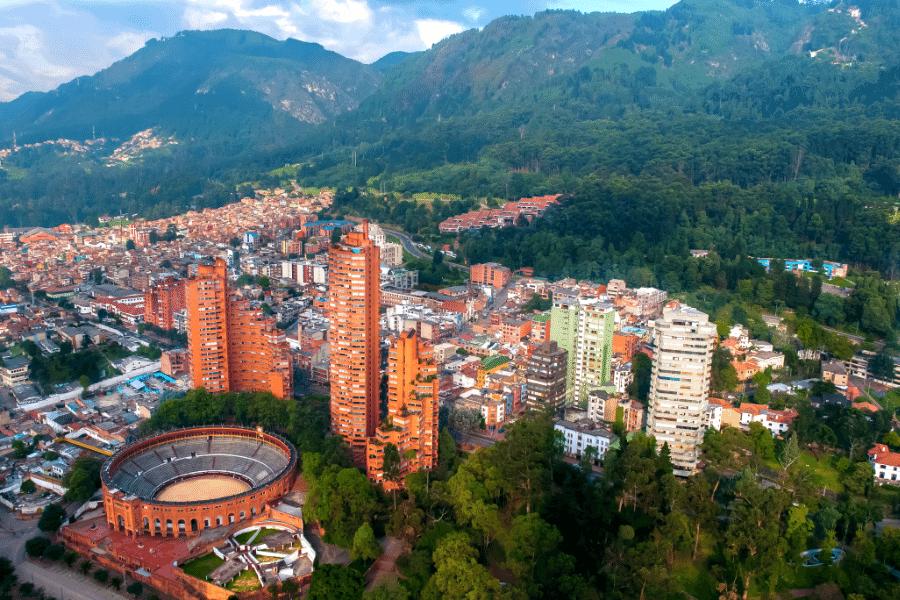
Let’s get one thing straight: there are bad areas in every city in the world.
Sure, some places have higher violent crime rates than others, but it always pays to do your research, especially when it comes to ‘up and coming’ countries of the world.
Another thing is: you don’t know what you don’t know.
We would always recommend visiting Bogota and having a professional investment advisor show you around. The Nomad Capitalist team can help you discover the best neighborhoods and the best deals in-person – get in touch.
In the meantime, if you’d like to do some armchair browsing for real estate investments in Bogota, here are the basics.
Bogota city is divided into four sections:
- The South. You have no business being there, as it’s the poorer and dodgier part of town.
- El Centro. Pretty self-explanatory, the center of the city is where all of the main government offices and historical buildings are. This is the very heart of the city, but in terms of investing in residential real estate, there isn’t much scope for that in El Centro.
- El Occidente. There are some residential areas for the middle and upper class living in El Occidente. It’s also home to the city’s biggest sports venues and huge parks.
- The North. This is the area where most of the recent development has taken place. In fact, you could mistake it for any other big city in the world: mega malls, boutique shops, chic cafes, and lavish restaurants are dotted around upscale residential highrises and multinational corporation offices.
Sure, La Candelaria – the city’s cultural and historical epicenter – could seem appealing at first, but what you should be looking for are well-priced properties in safe areas.
Want our advice? Focus your search in the north of Bogota to score deals that range from $1,300 to $1,700 per square meter. It’s always best to buy an older apartment and renovate it to your taste.
Each of Bogota’s main areas is divided based on estratos and it’s best to invest in apartments in fourth, fifth, and sixth estratos, in areas such as:
- Chapinero. Inhabited mostly by upper-class residents, Chapinero is an area that’s clearly wealthy. Popular dining areas and nightlife centers – which include the popular Zona Rosa – are all located in Chapinero.
- Chico. This is an affluent neighborhood, mostly known for its two main parks – Parque el Virrey and Parque 93. Trendy cafes, all-night salsa clubs, and great restaurants are all the perks that make Chico a desirable area for expats and a great place to invest. The most common deal around here is a 75sqm apartment for $160,000, although cheaper options can easily be found too.
- Santa Barbara. High-end restaurants, tucked-away parks, and indie design shops all come together in Santa Barbara. It’s not as posh as Chapinero, but it has lots of charm. You’ll find every type of property: from English cottages and Spanish townhouses to modern highrises with huge balconies – Santa Barbra seemingly does have it all.
- Teusaquillo. A quiet and green neighborhood, it’s mostly populated by the middle and the middle-upper class. However, seeing as it is a historical neighborhood, many of its houses are really old and may require major renovation.
When choosing a neighborhood, think about what you’ll want to do with the real estate. Will you be living there for part of the year? Then pick a neighborhood that’s closest to your heart.
Short-term rent? Find a property that allows short-term renting in an area that’s frequented by tourists and offers them a convenient location in the city. And just a note, Bogota does have a lot of Airbnb potentials.
Want to rent for longer-term? It would probably be best to focus on young professionals and small families and opt for apartments near parks and public transportation links.
And as a final note, let us just reiterate how important it is to not take unnecessary risks. If you’re unsure about a neighborhood or if it’s considered ‘up and coming,’ give the property a miss. There are plenty of good deals in safe locations to be had in Bogota.
How to Invest in Colombian Real Estate
The Colombian government has made it incredibly easy for foreigners to invest in real estate. Your rights are the same as those of a local Colombian.
Basically, all that you need are the funds and your passport and you’ll be good to go.
You have two options when it comes to buying real estate in Colombia:
- Invest as an individual. This option has the biggest pro of making you eligible for permanent residence. However, you will be missing out on privacy.
- Invest as a legal entity. This is the best option for those who want to purchase multiple properties to rent out. It’s also great for those who don’t want residency but also don’t want their name on all kinds of official documents.
Once you’ve decided which way you’re going, it’s time to find that property and negotiate your heart out.
And here is where you might experience cultural shock: most of the deals are done in cash and you shouldn’t expect any kind of discount when you’re paying this way.
Negotiating should help you get approximately 5-8% off the asking price, but not much more. And if the property has been on the market for a year or longer, expect no discount either.
If you haven’t been living in the country for longer than six months, you’ll need to register all the funds that you’re transferring to Colombia as a foreign investment with the Bank of the Republic.
This is a very meticulous process and you cannot afford to mess it up; you would be risking huge fines or even losing all of your funds, and your residence permit not being granted.
There is no Colombian real estate purchase scenario where we would recommend for you to go at it alone.
You should always hire a lawyer who can then help you navigate all of the laws and the paperwork that’s needed to complete a real estate purchase. And since not all lawyers have a solid understanding of the real estate law, you should vet yours carefully – we can help you do that.
Similarly, you could hire a translator if your Spanish isn’t great, or simply find a lawyer who speaks fluent English to skip having yet another person tagging along with you.
But be wary of the ‘gringo agents’ who will want to ‘do everything for you’, but then charge quite a big premium.
The Process of Buying Colombian Real Estate
Once you’ve got a property, a price, and a way to transfer your funds to the country legally, there are three steps that you’ll need to take to become a legal owner of the property.
All of them can be completed in approximately three weeks time, but give it a month to accommodate the leisurely Latin pace.
1. Get a Certificate of Tradition and Liberty
Ok, so this is a direct translation of the Certificado de Tradicion y Libertad which contains all of the information about the real estate, starting with its historical ownership records, mortgage history, any work that was carried out, and so on.
You will need the help of your lawyer at this step. He/she will need to verify that the certificate is legitimate. The lawyer will also check that all municipal taxes on the property have been taken care of.
Furthermore, you will need to get the property checked out and inspected at this stage.
This step will normally take a week to complete and cost you whatever your lawyer’s hourly or daily rate is.
2. Draw Up the Purchase Agreement
Up until this point, all of the verbal agreements have been non-binding but it stops here. If you really want to purchase the real estate, a Promesa de Compraventa will need to be drawn up.
It’s a binding contract where you promise to buy the property and where the owner promises to sell it to you.
There will be certain conditions included in the purchase agreement:
- The exact price that was agreed upon
- An inventory of what exactly is included in the sale
- A down payment (normally 30%)
- A Penalty clause (10-20% of the downpayment if either side pulls out of the sale)
3. Sign the Public Deed (Escritura Publica)
The final step in purchasing a property in Colombia involves a lengthy visit to a notary’s office.
The process is very meticulous and ‘proper.’ You’ll spend the better part of your day in the office, signing a pile of paperwork.
They’ll probably even bring out juice and donuts, so settle in.
Signing the Escritura Publica will confirm you as the new and legal owner of the real estate.
There are fees involved here too:
- 0.15% free of the total value of the property that’s paid to the notary (plus VAT)
- 1% of the value of the property will also be withheld and applied towards the income tax that the old owner will now owe to the government
- The total amount of tax for the seller is 3.63-4.79% of the total value of the property. And for you, the buyer, it’s 1.65%.
Once the Deed is all paid for and signed, it will get to the Registry Office and the Cadastre of properties. You’ll then officially become the new owner of the property – congrats!
Maintaining Your Real Estate in Bogota
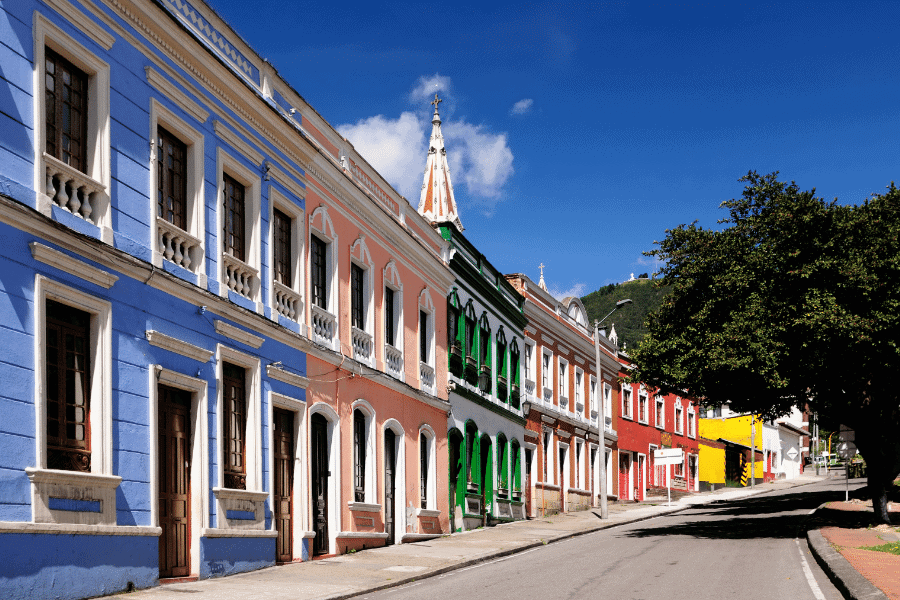
Once you’ve purchased your real estate in Bogota, you will have to maintain it regardless of what you do with it.
And Bogota is different from other countries in that you must be pretty hands-on when it comes to setting up all of your utility bills. You will either need to be there in person or have a power of attorney granted to someone to deal with all that for you.
Our recommendation? Set it all up when you’re there and make as many of your recurring bills run automatically.
In addition to the worldly worries of electricity and water bills, you’ll also have to take care of building maintenance fees (including your concierge, most of whom are very kind and personable), as well as property taxes.
Now, when you purchase real estate in Colombia, not only do you buy the house or the apartment, but the land that it sits on too.
That said, property taxes take into account both the value of the land and the building on it. The government then levies a property tax of 0.1%-3.30% – not much, but still something you should keep in mind.
The Challenges of Buying Colombian Real Estate
Buying real estate is never a walk in the park, especially if it’s one of your first investments abroad. You will probably feel unsure, anxious, or outright terrified when it comes to actually following through with the purchase.
Yet, knowing what the main challenges of buying Colombian real estate are can help you lower the feelings of uncertainty and fear.
Things happen slower. Just like you’d expect in Latin America, things in Colombia happen at a much slower pace. A more relaxed life is in the Colombian blood, so there isn’t much that you can do about it but to accept it and set realistic expectations for how quickly you’ll get things done.
You’ll be doing some forex trading. Willingly or not, you’ll be doing some foreign currency trading when you purchase real estate in Colombia. So, up to the very last minute, you won’t be able to pin down the exact price of the property because the exchange rate of the Colombian peso will bob up and down.
There is no title insurance and no escrow. Colombia is quite different from most western countries in that it doesn’t have these buyer protection measures in place. You will, quite literally, need to transfer the full asking price to the real estate owner as you purchase it – crazy. So, it’s paramount that you have a highly experienced (and recommended) lawyer who fully understands the labyrinthine Colombian real estate laws.
Short-term rental challenges. If you’re interested in renting out your Bogota property on Airbnb – wholly or during periods that you’re not there – listen up. Rentals shorter than 30 days fall under specific laws, which could prevent you from renting out your property. For example, your unit must meet strict fire prevention criteria. Plus, many apartment buildings themselves permit short-term rentals; if 70% of the property owners in a building vote to make short-term rentals illegal, there will be nothing you can do.
Selling your real estate. There might come a time when you’re no longer interested in holding Colombian real estate as part of your investment portfolio. And while it’s relatively quick to buy real estate in the country (approximately 3-4 weeks), it will probably take much longer than that to sell it. The higher-end the property, the longer it will take to sell. You can expect your property to sit on the market for at least half a year.
Obtaining Residence and Citizenship in Colombia
In addition to offering a decent return on investment and generally being a good investment opportunity, buying real estate in Colombia has one major benefit that everyone’s buzzing about.
That benefit is a permanent residence that you’ll automatically be entitled to if you spend approximately $170,000 on Colombian real estate.
The exact number will depend on the current national minimum wage and the currency exchange rate between the US dollar and the Colombian peso. To get an accurate figure, the minimum wage is multiplied by 650, and converted to dollars. For 2021, the investment value is, therefore, $172,707.
Five years later (or two years if you happen to have a local spouse or child), you can apply for a Colombian passport.
A Colombian passport is now much better than it used to be. Not only will you be able to travel to 125+ countries visa-free, but you’ll also be granted access to Europe’s Schengen zone visa-free.
Another great thing is that Colombia allows dual citizenship, so you won’t need to renounce your current citizenship if you decide you’d like to obtain a Colombian passport.
However, there are some cons to the process. First, you will need to pass a language test, as well as constitution, geography, and history exams to be allowed to gain Colombian citizenship.
And don’t forget the mandatory military service for all men under the age of 50. Though keep in mind, you can be excluded for several reasons including having served abroad with proof of service.
Still keen to start the process? Here’s how one can get the Colombian investment visa (and a subsequent passport, if necessary).
Actually, it couldn’t be simpler and the entire permanent residence application process can be done online by submitting PDF files of all the paperwork of your real estate purchase. So, unlike with many other countries, the process of obtaining residence visas and citizenships hasn’t been paused by the COVID-19 pandemic. The total cost of applying for the visa is $450.
Once you get your investor visa, keep in mind that you can lose it if you don’t visit the country at least once every 2 years.
And this is important if you want to work towards a passport, which requires that one is a permanent resident of the country for at least five years prior to lodging a naturalization application.
To sum it up, about $170,000 is the magical number you’ll need to keep in mind when it comes to the price of your desired real estate.
If you want to find out more about Colombia’s residence or citizenship programs, visit this page or get the Nomad Capitalist team to help you.
NOTE: The amount of approximately $170,000 must be registered on the deed or the property purchase. Some property owners will try to register a lower price to pay less tax, but you must ensure that does not happen. Our advice would be to look for the property above the required minimum investment amount and then try to negotiate it down. The other way around simply won’t work.
Colombia Real Estate – FAQs
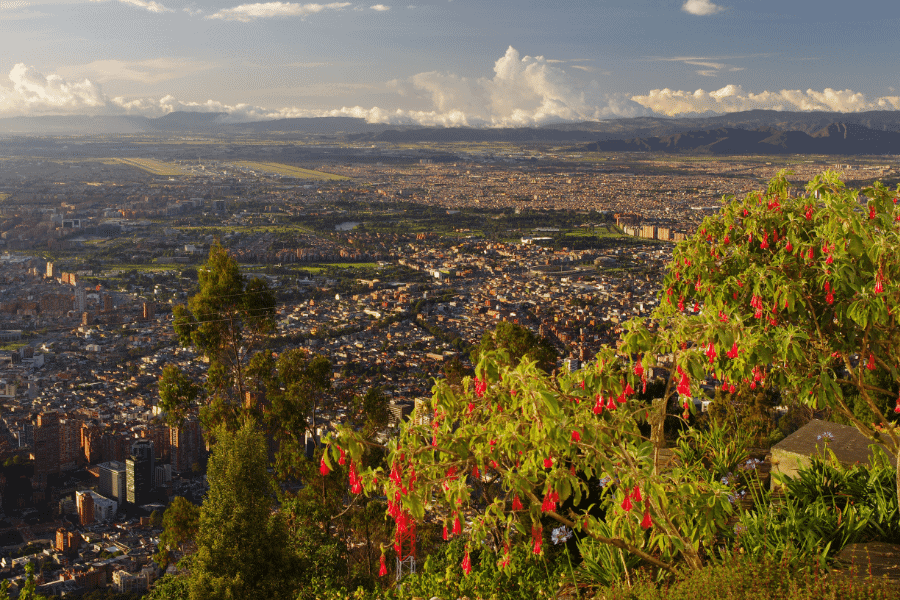
How much do I need to invest in Colombian real estate to become a resident?
You’ll need to invest at least $170,000 in property to become eligible to apply for permanent residency. Note that this amount changes slightly each year and must be specified on the purchase deed.
What sorts of properties can I buy in Colombia?
You can find apartments, houses, commercial property, wineries, farms, and even rural haciendas for sale in Colombia. However, we’d recommend going for apartments in Bogota — a type of property that has the highest possible liquidity and offers some of the highest returns too. All sorts of real estate purchases at or over $170,000 will qualify you for the resident permit.
Can I buy Colombian real estate through a legal entity and obtain a residence?
No. Only individuals are able to purchase real estate and obtain a permanent residence in Colombia. In other words, you cannot use a company or a trust to apply for residence if you invest in a property. You can, however, use a legal entity to purchase real estate in Colombia if you’re not interested in obtaining residency and want to protect your privacy.
Is it easy to obtain Colombian residence?
We’d say so. The country is extremely keen to obtain foreign investment, so it has created a very clear set of eligibility criteria and a straightforward application process for you to follow. There won’t be any excessive hoops that you’ll have to jump through, nor a ridiculous amount of time that you’ll need to spend filling out paperwork.
What’s the best neighborhood to buy real estate in Bogota?
It will depend on what you’re looking for but our advice would be to go for properties to the north of the historical center of Candelaria. Not only are those neighborhoods close to the city center but they also have all of the amenities that someone living an upper-class lifestyle could need, including upscale restaurants and all-night salsa clubs. We’d recommend the Chico, Santa Barbara, or Chapinero neighborhoods when you’re looking for great investments in Bogota.
Colombia Real Estate: A Key Investment
If you ask a handful of your friends which country in Latin America they could see themselves investing in, they’d probably say Brazil, Chile, or perhaps even Mexico.
We bet no one would say Colombia and it’s absolutely their loss.
The rest of the world still hasn’t figured out that Colombia has moved on so much since the druggy and bloody 80s and 90s – that’s great news for you.
Sure, there is a stigma that you will need to overcome. Sure, parts of Colombia (i.e., some rural areas and the impoverished urban neighborhoods) are still no-go zones. But the country has come such a long way, especially its cities like Bogota.
Colombia is now a highly modern country with a stable economy and a growing and highly-skilled population of extremely happy and friendly people. A great quality of life is guaranteed if you chose to move there.
We’ve been investing in Colombian real estate for years, but should you do the same?
Since it’s still not on many people’s radar, there are plenty of great deals to be had by people who can appreciate Colombia’s potential. And who knows where the real estate prices will go when they’ve already doubled in the past decade?
Investing in real estate in Bogota is also a perfect way to plant your flags, get permanent residence, and even score a second passport if you’re up for it.
Even though the investment world still hasn’t fully embraced Colombia, the world’s governments have. Colombia’s passport has gained considerable power in the last decade.
So, do you want to diversify your investment portfolio with a real estate purchase in Bogota and open up doors to various opportunities you never thought were available to you before?
We can help you figure it all out. Get in touch today and let’s talk.


Is Land Investment Safer?
When American humorist and writer Mark Twain said, ’Buy land, they’re not making it anymore,’ he was definitely on to something. Land is finite, and that scarcity gives it lasting appeal. Yet, despite its obvious logic, land remains one of the most misunderstood investments. Many people are put off by its perceived complexity, potential legal […]
Read more

Top Emerging Market Economies for US Investors in 2025
If you’re still parking all your capital in overvalued US real estate or clinging to tech stocks in the S&P 500, you’re playing an old game while rivals are redesigning the board. The world has move on. Smart investors know that the biggest returns aren’t coming from Wall Street anymore – they’re coming from below-the-radar […]
Read more

Capital Gains Tax on Real Estate in the United States
For most people, buying a home is the single largest financial commitment they’ll ever make – and often, one of the most stressful. Yet, for many US citizens, home ownership remains a cornerstone of the American Dream. Whether it’s about financial security, independence or building generational wealth, millions strive to get on the first rung […]
Read more




